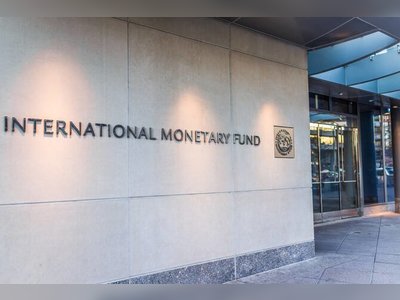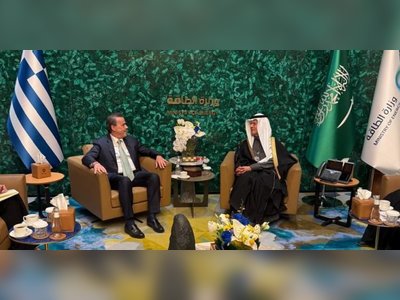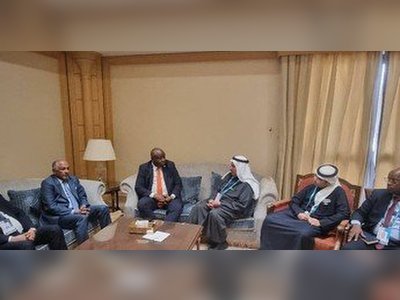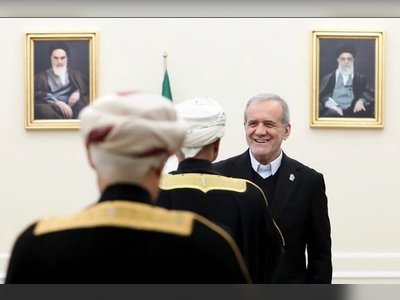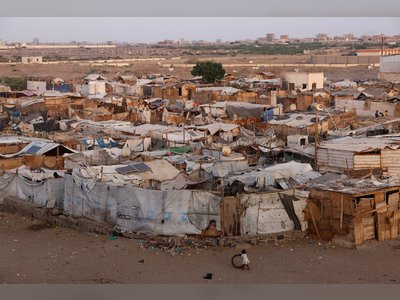Removing the Political Adversary is Dismantling What's Remaining of Turkey's Economy.
The ongoing crisis in Turkey, sparked by the detention of Istanbul Mayor Ekrem İmamoğlu, coincides with a particularly fragile period—just as Finance Minister Mehmet Şimşek and the Central Bank were beginning to rein in inflation and carefully lower interest rates. Nevertheless, the recent court ruling to prolong İmamoğlu's detention while awaiting trial has fueled renewed public unrest, jeopardizing economic stability and eroding investor confidence.
İmamoğlu's arrest, along with several associates last Thursday on charges of "corruption and aiding terrorism," sent shockwaves through Turkey's already delicate markets, akin to an economic earthquake. The market's immediate response highlighted this upheaval: The Istanbul Stock Exchange plummeted by around 8% within hours, wiping out billions in market value. Concurrently, the Turkish lira reached record lows against both the euro and the U.S. dollar, reflecting investor panic and a loss of confidence.
Only a substantial intervention by the Central Bank, infusing an estimated $8-10 billion from its foreign currency reserves, managed to prevent further decline in the currency's value. Although this move temporarily stabilized the lira, the effectiveness of such measures is constrained; while the Central Bank holds about $60 billion in reserves, ongoing political instability could quickly deplete these resources, leaving the economy perilously vulnerable.
By Friday, markets showed tentative signs of recovery, with a slight 2% rebound, and over 3% gains noted on Monday morning. However, analysts warn against viewing this limited recovery as a sign of enduring stability. The court's decision on Sunday to keep İmamoğlu imprisoned until his trial reflects President Recep Tayyip Erdoğan’s steadfast intention to politically neutralize his chief adversary, who was expected to challenge Erdoğan in the crucial 2028 elections.
Political Repression Triggers Widespread Civil Unrest
Ekrem İmamoğlu is not just any political figure; his charismatic presence transcends traditional party lines, significantly broadening his base of support. Therefore, his arrest has ignited an immediate and vigorous backlash, with large protests erupting in Istanbul, Ankara, Izmir, and other major cities. Erdoğan's opponents perceive the charges as overtly political, aimed solely at consolidating Erdoğan's power ahead of future electoral contests.
Istanbul has rapidly descended into chaos due to the ongoing street protests, resulting in serious transportation disruptions. Authorities have implemented restrictions, including numerous police roadblocks and traffic diversions, exacerbating disturbances in public transport and commerce. This upheaval extends beyond mere inconveniences for residents; it markedly affects small businesses, service sectors, and overall productivity, worsening economic instability.
Immediate Economic Fallout and Investor Sentiment
The repercussions of İmamoğlu’s arrest triggered swift reactions from international investors and major financial institutions. JPMorgan quickly adjusted its economic outlook for Turkey, raising its year-end inflation forecast from 27.2% to 29.5%. In line with this, JPMorgan now anticipates Turkish interest rates will hit 35% by year’s end, a significant increase from the previously estimated 30%. These revisions indicate a clear decline in investor confidence regarding Turkey’s short- to medium-term economic outlook.
This political and economic crisis strikes at a particularly vulnerable moment. After concluding 2024 with inflation around 40%, down significantly from 75% the previous year, Turkey's Central Bank had cautiously begun a strategy of gradual interest rate cuts. These reductions, carefully managed by Finance Minister Mehmet Şimşek, reflected Turkey’s initial recovery from a protracted recession that characterized most of 2024. Last year’s GDP growth of 3.2%, including a robust final-quarter surge of 3%, seemed to signal a gradual economic recovery.
However, the sudden political instability triggered by İmamoğlu's arrest threatens to undo these hard-fought achievements. Ongoing market volatility could reverse recent progress, quickly destabilizing months of careful policy efforts by the Finance Ministry and Central Bank.
Erdoğan’s Resolve and Geopolitical Implications
President Erdoğan’s resolute determination to eliminate political threats ahead of forthcoming elections is becoming increasingly apparent. While such strategies may achieve short-term political gains, they simultaneously damage Turkey’s international standing, economic prospects, and diplomatic leverage. Analysts express concern that ongoing authoritarian measures could further alienate Turkey geopolitically, restrict access to foreign capital markets, and complicate essential international negotiations, particularly with key allies in Europe and the United States.
Furthermore, the recent arrests exacerbate already tenuous relations with the European Union, casting doubt on Turkey’s future economic cooperation prospects, including vital trade agreements and foreign direct investment influxes. The European Parliament and U.S. Congress have previously voiced grave concerns over Turkey's democratic decline, and recent events are sure to intensify this criticism.
Foreign Investors’ Concerns and Capital Flight Threats
The arrests significantly heighten uncertainty among foreign investors, prompting a notable shift away from Turkish assets to safer holdings like gold and U.S. dollars. Analysts predict ongoing pressure on the lira, which may lead to continued depreciation. A persistent 10% annual depreciation of the Turkish lira, reflecting recent short-term declines, could elevate inflation rates by about 5% annually, complicating Turkey's efforts to combat inflation.
Foreign investors, already hesitant due to previous currency crises and political instability, might accelerate their capital withdrawal. Such an exodus would impose severe, long-lasting damage on Turkey’s fiscal stability, diminishing vital foreign direct investments essential for sustainable economic growth.
Interest Rate Policy Under Growing Pressure
In light of the heightened political and economic volatility, questions persist about the Central Bank’s forthcoming policy decisions. Since December 2024, the Central Bank has cut interest rates three consecutive times, encouraged by earlier inflation easing. As of now, Turkey’s benchmark interest rate stands at 42.5%, notably reduced from 50% at the end of 2024.
Given the renewed inflationary pressures and ongoing political uncertainty, the Central Bank may find itself compelled to reverse recent rate cuts. Nevertheless, Finance Minister Şimşek remains publicly resolute, firmly asserting his commitment to continue cautious rate reductions. While acknowledging the recent challenges, Şimşek insists on adhering to his established approach, striving for a balance between inflation control and economic stimulus.
However, market reactions may ultimately shape policy shifts, urging the Central Bank to reassess its strategy. Analysts speculate that the Bank may need to temporarily halt any further planned rate cuts in the coming months, adopting a cautious, responsive approach to navigate the economic uncertainties triggered by political instability.
Conclusion and Prospective Analysis
The ongoing political turmoil surrounding Ekrem İmamoğlu’s detention poses significant risks to Turkey's economic future. While Erdoğan may achieve his immediate political goals by sidelining formidable rivals, the long-term repercussions—escalating inflation, capital flight, and declining investor confidence—could gravely undermine the nation's broader economic stability and global standing.
Investors and policymakers should brace for ongoing volatility, closely tracking key indicators: currency fluctuations, inflation metrics, investor behavior, and governmental policy pronouncements. Ultimately, political stabilization and confidence-building measures will be crucial for Turkey’s long-term economic recovery and sustainability.
In the absence of prompt corrective measures and political reconciliation, Turkey risks profound economic decline, potentially sacrificing years of hard-earned progress for short-term political ambitions.
Only a substantial intervention by the Central Bank, infusing an estimated $8-10 billion from its foreign currency reserves, managed to prevent further decline in the currency's value. Although this move temporarily stabilized the lira, the effectiveness of such measures is constrained; while the Central Bank holds about $60 billion in reserves, ongoing political instability could quickly deplete these resources, leaving the economy perilously vulnerable.
By Friday, markets showed tentative signs of recovery, with a slight 2% rebound, and over 3% gains noted on Monday morning. However, analysts warn against viewing this limited recovery as a sign of enduring stability. The court's decision on Sunday to keep İmamoğlu imprisoned until his trial reflects President Recep Tayyip Erdoğan’s steadfast intention to politically neutralize his chief adversary, who was expected to challenge Erdoğan in the crucial 2028 elections.
Political Repression Triggers Widespread Civil Unrest
Ekrem İmamoğlu is not just any political figure; his charismatic presence transcends traditional party lines, significantly broadening his base of support. Therefore, his arrest has ignited an immediate and vigorous backlash, with large protests erupting in Istanbul, Ankara, Izmir, and other major cities. Erdoğan's opponents perceive the charges as overtly political, aimed solely at consolidating Erdoğan's power ahead of future electoral contests.
Istanbul has rapidly descended into chaos due to the ongoing street protests, resulting in serious transportation disruptions. Authorities have implemented restrictions, including numerous police roadblocks and traffic diversions, exacerbating disturbances in public transport and commerce. This upheaval extends beyond mere inconveniences for residents; it markedly affects small businesses, service sectors, and overall productivity, worsening economic instability.
Immediate Economic Fallout and Investor Sentiment
The repercussions of İmamoğlu’s arrest triggered swift reactions from international investors and major financial institutions. JPMorgan quickly adjusted its economic outlook for Turkey, raising its year-end inflation forecast from 27.2% to 29.5%. In line with this, JPMorgan now anticipates Turkish interest rates will hit 35% by year’s end, a significant increase from the previously estimated 30%. These revisions indicate a clear decline in investor confidence regarding Turkey’s short- to medium-term economic outlook.
This political and economic crisis strikes at a particularly vulnerable moment. After concluding 2024 with inflation around 40%, down significantly from 75% the previous year, Turkey's Central Bank had cautiously begun a strategy of gradual interest rate cuts. These reductions, carefully managed by Finance Minister Mehmet Şimşek, reflected Turkey’s initial recovery from a protracted recession that characterized most of 2024. Last year’s GDP growth of 3.2%, including a robust final-quarter surge of 3%, seemed to signal a gradual economic recovery.
However, the sudden political instability triggered by İmamoğlu's arrest threatens to undo these hard-fought achievements. Ongoing market volatility could reverse recent progress, quickly destabilizing months of careful policy efforts by the Finance Ministry and Central Bank.
Erdoğan’s Resolve and Geopolitical Implications
President Erdoğan’s resolute determination to eliminate political threats ahead of forthcoming elections is becoming increasingly apparent. While such strategies may achieve short-term political gains, they simultaneously damage Turkey’s international standing, economic prospects, and diplomatic leverage. Analysts express concern that ongoing authoritarian measures could further alienate Turkey geopolitically, restrict access to foreign capital markets, and complicate essential international negotiations, particularly with key allies in Europe and the United States.
Furthermore, the recent arrests exacerbate already tenuous relations with the European Union, casting doubt on Turkey’s future economic cooperation prospects, including vital trade agreements and foreign direct investment influxes. The European Parliament and U.S. Congress have previously voiced grave concerns over Turkey's democratic decline, and recent events are sure to intensify this criticism.
Foreign Investors’ Concerns and Capital Flight Threats
The arrests significantly heighten uncertainty among foreign investors, prompting a notable shift away from Turkish assets to safer holdings like gold and U.S. dollars. Analysts predict ongoing pressure on the lira, which may lead to continued depreciation. A persistent 10% annual depreciation of the Turkish lira, reflecting recent short-term declines, could elevate inflation rates by about 5% annually, complicating Turkey's efforts to combat inflation.
Foreign investors, already hesitant due to previous currency crises and political instability, might accelerate their capital withdrawal. Such an exodus would impose severe, long-lasting damage on Turkey’s fiscal stability, diminishing vital foreign direct investments essential for sustainable economic growth.
Interest Rate Policy Under Growing Pressure
In light of the heightened political and economic volatility, questions persist about the Central Bank’s forthcoming policy decisions. Since December 2024, the Central Bank has cut interest rates three consecutive times, encouraged by earlier inflation easing. As of now, Turkey’s benchmark interest rate stands at 42.5%, notably reduced from 50% at the end of 2024.
Given the renewed inflationary pressures and ongoing political uncertainty, the Central Bank may find itself compelled to reverse recent rate cuts. Nevertheless, Finance Minister Şimşek remains publicly resolute, firmly asserting his commitment to continue cautious rate reductions. While acknowledging the recent challenges, Şimşek insists on adhering to his established approach, striving for a balance between inflation control and economic stimulus.
However, market reactions may ultimately shape policy shifts, urging the Central Bank to reassess its strategy. Analysts speculate that the Bank may need to temporarily halt any further planned rate cuts in the coming months, adopting a cautious, responsive approach to navigate the economic uncertainties triggered by political instability.
Conclusion and Prospective Analysis
The ongoing political turmoil surrounding Ekrem İmamoğlu’s detention poses significant risks to Turkey's economic future. While Erdoğan may achieve his immediate political goals by sidelining formidable rivals, the long-term repercussions—escalating inflation, capital flight, and declining investor confidence—could gravely undermine the nation's broader economic stability and global standing.
Investors and policymakers should brace for ongoing volatility, closely tracking key indicators: currency fluctuations, inflation metrics, investor behavior, and governmental policy pronouncements. Ultimately, political stabilization and confidence-building measures will be crucial for Turkey’s long-term economic recovery and sustainability.
In the absence of prompt corrective measures and political reconciliation, Turkey risks profound economic decline, potentially sacrificing years of hard-earned progress for short-term political ambitions.



